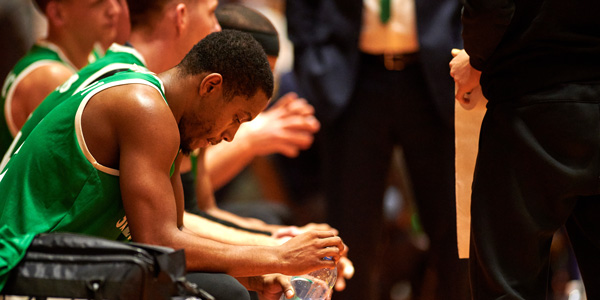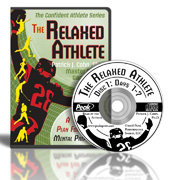
Staying Mentally Tough When Facing Adversity
Most athletes pay no attention to purposefully training their minds. Instead, these athletes leave their mental response to chance.
You want to consistently train your brain by sending yourself positive messages. If you are not actively training your brain, you passively train your brain. That is, whatever messages pop up in your mind, either negative or positive, will affect future performances.
For example, if you haven’t actively trained your brain and a referee or official blows a call, your mental response may be, “This always happens to me. The officials are out to get me. The officials are favoring the other team.”
This negative response will cause you to become frustrated and angry. You will not be able to focus, and you will make more mistakes.
In the same situation, you can train your brain to respond with mental toughness, “No matter what the official does, It doesn’t matter. I can handle anything.”
If you keep sending yourself consistent empowering messages, you will respond with mental toughness automatically.
The best way to train your brain to handle adversity is to learn to cope with adverse conditions in practice and respond positively. In other words, respond the way you want to react in competitions.
You never want to leave your mental game to chance. You control how you respond in adversity by anticipating challenges and being ready to respond.
If you want to play hard when you are tired in competitions, you can train your brain by pushing yourself hard at the end of practice and sending yourself strong messages:
“I will outwork everyone at the end of practice. I will work hard until the very last second. Nothing can stop me.” The key is to train your brain actively.
Training your Mind to Cope with Adversity
You can learn to cope with adversity by imagining scenarios you might see during a game and how you will cope with it, such as going into the game cold on short notice.
Visualization is not always about rehearsing yourself perform at your peak!
Start by thinking about what might be challenging for you during a game. An interception? Missing a tackle? Harsh weather conditions?
Next, how will you cope with each situation so that you can perform your best despite the challenge?
Related Sports Psychology Articles
- The Mindset to Perform at a Higher Level
- Having Fun While Performing at Your Best
- The Importance of Mental Toughness
*Subscribe to The Sports Psychology Podcast on iTunes
*Subscribe to The Sports Psychology Podcast on Spotify
*Subscribe to The Sports Psychology Podcast on YouTube
Download a free sports psychology report to improve your mental game!
Learn more about our one-on-one mental game coaching.
The Relaxed Athlete

You can possess all the physical talent in the world, the best equipment money can buy, and train harder or longer than anyone else in your sport or on your team, but if self-doubt enters your mind prior to competition, you simply will not realize your true potential in sports.
The Relaxed Athlete” audio and workbook program teaches you mental strategies to develop a focused and confident pregame routine for a poised and relaxed mindset. Learn how to get your mind right by overcoming pregame anxiety and worry.
